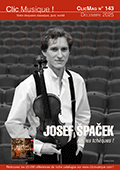 Joseph Haydn (1732-1809) sera le plus connu des compositeurs de cette anthologie de chansons d’amour de l’époque classique viennoise où se côtoient, certes Mauro Giuliani, les plus oubliés Josef Anton Steffan, Johann Holzer, Carl Friberth, Leopold Kozeluch, Martin Ruprecht et Franz Anton Hoffmeister. Ne manque à l’appel qu’un Wolfgang Amadeus Mozart, tant son style musical tardif – je pense à la "Flûte enchantée" - est sous-jacent dans ces bluettes, tendres badinages perlés de fraîcheur autrichienne ! Et on se surprend à entrevoir le chemin qui conduit à Beethoven et bien sûr aux lieder de Schubert en laissant de côté toute noirceur pour ne conserver que la légèreté de la romance. Ici tout est beau, minaudé à souhait et joliment dosé entre le ténor, le pianoforte ou la guitare romantique avec, ne gâchons pas notre plaisir, une prise de son magnifiquement équilibrée qui nous mène dans un salon où on imagine la décoration rocaille dégoulinante ! On sent que Markus Miesenberger joue avec délectation des textes – même pour les non-germanistes dont je fais partie – musarde, toujours avec un sourire taquin, des dents parfaitement blanches et des yeux qui pétillent, en nous baladant à notre insu dans un univers où la musique n’a que peu d’intérêt en fin de compte. Et on se prend au jeu avec bonheur à écouter les détimbrés du ténor, les notes perlées du pianoforte et le lyrisme de la guitare. Un presque rien fait parfois presque tout… et c’est réjouissant ! (Florestan de Marucaverde)  The idea for this recording originated from a direct comparison of the two songs “Cupido” and “Kupido” by the famous composer Joseph Haydn and the lesser-known Viennese composer Johann Holzer. Although both masters use the same text, the musical settings differ considerably in both nature and form. While Haydn’s tunes present the content with a twinkle in the eye and a great deal of subtlety, Holzer’s piece invites the listener to dance along, sparkling with joie de vivre and musicality. Joseph Haydn’s songs encompass a wide musical range and are of invaluable significance for the development of the genre: they represent a crucial part in the advancement of the Viennese lied, leading up to Franz Schubert. Around the same time, between 1778 and 1791, a song collection of the highest quality was produced in Vienna, the importance of which has been completely forgotten over the centuries. Josef Anton Steffan, Johann Holzer, Carl Friberth, Leopold Kozeluch, Martin Ruprecht and Franz Anton Hoffmeister were only some of the many highly creative composers based in the Austrian imperial city. These composers prepared the ground for the accomplished art songs of Mozart, Beethoven and Schubert. As with many Viennese characteristics, a wide variety of stylistic devices are intermingled: folk-like elements, characteristics of the Singspiellied and the North German lied are formed into a completely new musical genre with the additional influence of the Italian aria. The connection to the nineteenth century is made by French songs, first issued in Vienna in 1810 by the Italian guitar virtuoso Mauro Giuliani. For this project, a historical string instrument was chosen to provide an even greater sense of intimacy. Erich Traxler played on a historic 1815 Innsbruck fortepiano by Johann Georg Gröber, and Christian Haimel played a gut-strung guitar of around 1850, inspired by Johann Anton Stauffer and built by an anonymous maker. All these special features are intended to breathe new life into the romantic songs about love, passion, tenderness, affection, loss, fidelity and infidelity, providing a genuine, unadulterated and natural character. They enchant and seduce us into an old Vienna full of longing, devotion, charm, wit and a musical zest for life!
 |
